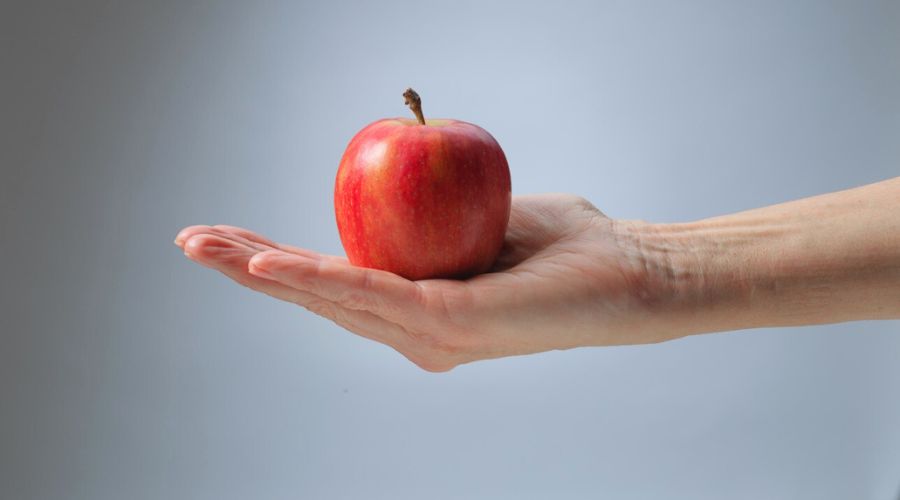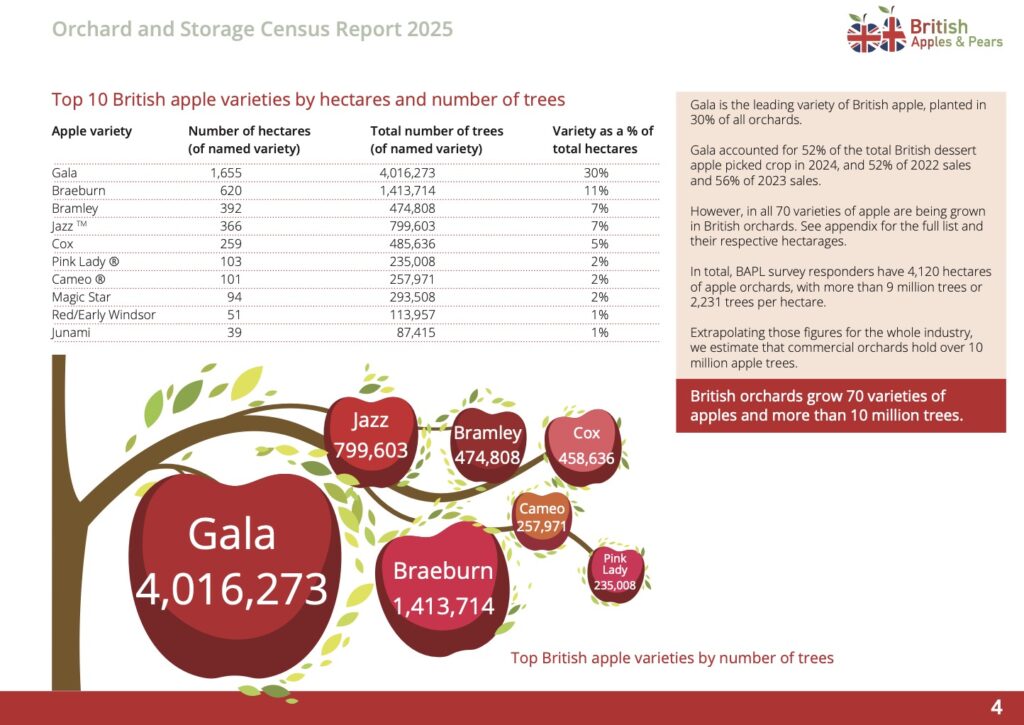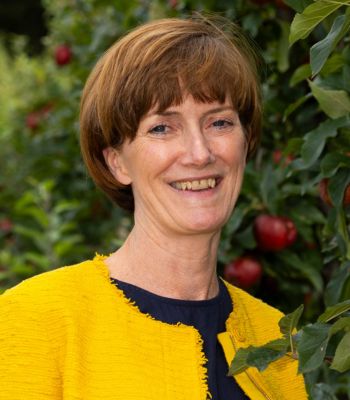BAPL releases ‘most detailed picture’ of UK apple and pear sector
16th July 2025
British Apples & Pears Limited (BAPL) has shared the results of two in-depth studies into the UK apple and pear orchard infrastructure.

The orchard census and storage survey results reveal the growth potential of British apples and pears, the possible risks of inaction and what practical steps are needed to secure the sector’s long-term success.
Critically, the surveys reveal a level of planned planting that, if it continues, will lead to the gradual decline of apple and pear growing in the UK.
British apple and pear orchard hectarage has been stable for almost 10 years (5,577 hectares in 2016 compared to 5,532 hectares in 2025). However, 2023 and 2024 were two of the three lowest hectarage years.
Furthermore, in the last five years, an average of 213 hectares of apple orchards were planted each year. In the next three years, only 145 hectares are planned to be planted with new trees. This marks a 32% drop compared to the five-year average.
This is not because growers already have lots of young, productive trees. In fact, 12% of all British apple orchards and 55% of all British pear orchards are more than 21 years old, BAPL said.
To simply maintain the current hectarage of apple orchards, UK growers would need to plant 369 hectares of new orchards each year. They are planning less than half of that (145 hectares). At that rate, we would have half the orchards we have today in just 12 years (2037).
At a time when climate change affects import availability and price, and when healthy eating and UK food security should be top of the agenda, growers are holding back on orchard expansion. Without a strong business case to invest in new trees, the sector will decline – reducing the availability of fresh British apples and pears, BAPL warns.
Key findings
Key apple findings of the BAPL tree census survey include:
- BAPL survey responders have 4,120 hectares of apple orchards, with more than 9 million trees or 2,231 trees per hectare. Survey responders represented 92% of the picked crop of British apples and pears, therefore, BAPL estimates that commercial orchards hold over 10 million trees.
- In total, more than 70 apple varieties are being grown in British commercial orchards, with 36 different varieties planted in the last five years alone.
- Gala is grown in 30% of all apple orchards and Braeburn in 11%. These are the most dominant varieties.
- However, Braeburn and Gala are declining. Braeburn was 20% of all apple orchards 11-15 years ago; it is 11% today. Gala was 54% of all apple orchards 11-15 years ago; today it is 38%. This is a symptom of the declining profitability of these varieties.
- Recent planting (within the last five years) has seen big investment in Jazz (139 hectares), Pink Lady (100 hectares), Magic Star (80 hectares) and Cameo (43 hectares). Even 38 hectares of Cox, one of the oldest apple varieties was planted in the last five years.
Key pear findings of the BAPL tree census survey include:
- BAPL survey responders have 702 hectares of pear orchards with just over 1 million trees or 1,438 trees per hectare.
- The Conference variety accounts for 93% of all pear orchard hectares, but there are actually 10 different varieties of pear being grown commercially in the UK.
- More than half (55%) of all Conference pear orchards are over 21 years old.
- In the last five years an average of just 20 hectares of pear orchards were planted per year.
- No growers surveyed are planning on planting any new pear trees in the UK in 2026 or 2027. Pears are simply not profitable for UK growers due to low returns.

‘The most detailed picture we’ve ever had’

Ali Capper, executive chair of BAPL, said that supermarkets must support the British top fruit industry now, before it is too late.
“They can’t rely on imports when climate change and geopolitical events will undoubtedly lead to scarcity. With long-term retailer commitments, growers can invest and ensure the future of British orchards and fruit supply. But it needs to happen now, before we start to lose our wonderful British apples and pears.”
The BAPL surveys also revealed that 840 hectares of apple and pear orchards currently lie fallow; they are either not planted or being replanted. While the industry would expect around 5-10% of orchards to be ‘resting’ between old and new plantings at any one time, 840 hectares is 15% of the total UK commercial orchard hectarage.
This represents a missed opportunity for orchard expansion that would not involve having to increase farmland area, BAPL said.
Once apples and pears are harvested, they are either transported straight to packhouses and then on to supermarkets or put into controlled storage for sales later in the year. Apples and pears store incredibly well, with no discernible difference between freshly picked and straight-out-of-the-store fruit.
The tree census clearly indicates that the sector has the potential to expand production. But, to do that, British apple and pear growers need the storage capacity to keep the fruit fresh until it’s needed. BAPL undertook a major study into the sector’s storage capacity to inform future growth plans.
Storage survey
Key findings from the BAPL storage survey:
- Storage survey responders represent around 81% of the total picked crop of British apples and pears. Between them, they have 1,203 stores, which can hold 197,271 tonnes of fruit. That’s around 1.874 billion apples and pears.
- The vast majority (81%) of apple and pear stores are controlled atmosphere stores. However, more than half (63%) of all stores are over 15 years old. The newest stores have the best energy efficiency, which can help to reduce costs.
BAPL said that while the current storage capacity is appropriate for existing harvest quantities, more investment is needed to both replace old stores and build new stores to meet future growth targets.
Unfortunately, growers lack the confidence to make these investments.
Ms Capper added: “This is the most detailed picture we’ve ever had of the UK’s commercial apple and pear orchards — and it’s both inspiring and concerning. While we now have clear evidence that we have the potential to expand British apple and pear production, confidence among growers is being seriously undermined.
“We urgently need a policy and retail environment that supports long-term investment and growth, or we risk losing a vital part of British farming.”
To achieve the sector’s growth ambitions and, at the same time, meet the UK’s food security and national health targets, as well as grow the rural economy and support rural employment, BAPL is asking retailers to engage in long-term commitments and contracts that enable growers to invest in new orchards and new storage facilities.
The association is also calling on the government to increase the Annual Investment Allowance from £1 million to £10 million to support meaningful investment and efficiency improvements in growing systems, harvesting, grading, packing and storage as well as to include apple growers, stores and packhouses in the energy discounts planned for the manufacturing sector.
The government was also asked to ensure that increasing numbers of seasonal workers are available to handpick the apples and pears in British orchards, ensure the continuity of funding for members of PO schemes, and provide clear policy direction on how the end of the scheme will be managed.
“We face a watershed moment. We can either stand by and watch the gradual decline of the nation’s orchards, or — with the right collaboration between growers, retailers, and government — we can become a farming and food security success story. It’s time to invest in and grow these businesses,” Ms Capper concluded.
Read more fruit news.
